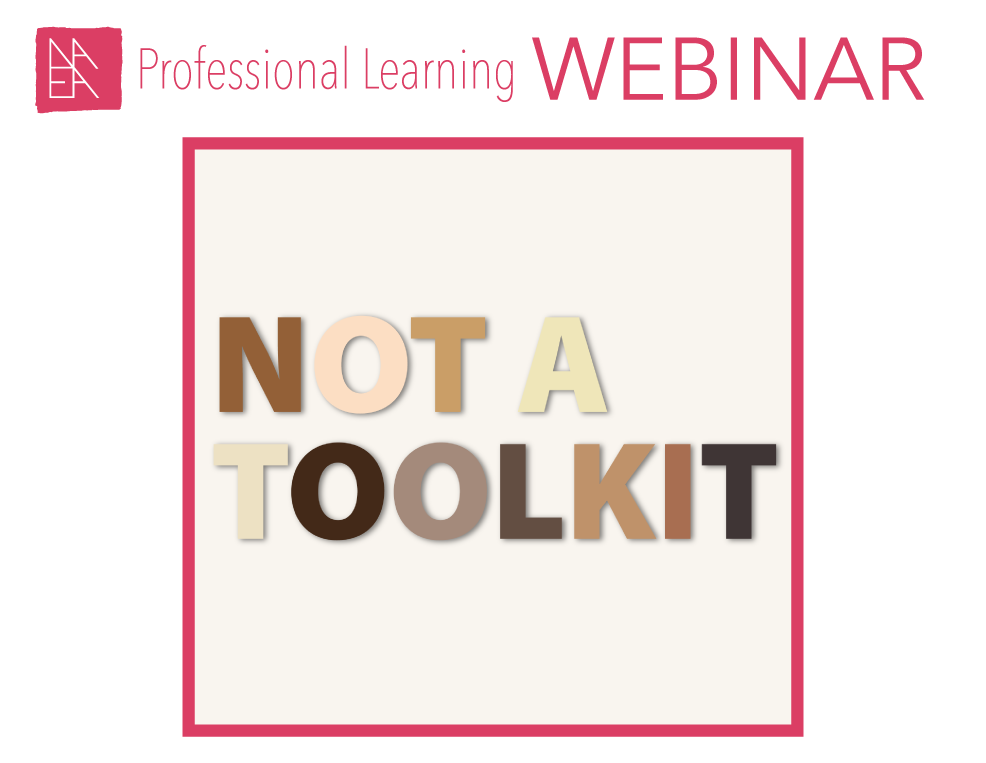
Not a Toolkit: Thinking With, Through, and Against Whiteness
-
Register
- Non-member - $49
- Member - Free!

Not a Toolkit: Thinking With, Through, and Against Whiteness
Wednesday, October 6, 2021
FREE for NAEA members; $49 for nonmembers
Three White members of an educator collective, formed around antiracist education and critical Whiteness studies, share their experiences and insight. “As a group, we talk, think, create, and denaturalize the ways that we are educated by and through whiteness—within our group and with others in our institutions and fields of practice. We have a shared commitment to doing this work with each other as a durational practice that allows us to create collaborative projects, revisit ideas, and hold each other accountable over time. We call ourselves ‘Not a Toolkit’ as a way of troubleshooting the one-off training, the objective-driven and quick-fix workshop, and the Diversity, Equity, and Inclusion (DEI) professional development model aimed at checking off boxes and responding to urgent news cycles around racist violence. Rooted in long-term, embodied, sloggy, and uncomfortable engagements with Whiteness, we will describe a messy history of doing this work and offer creative prompts for thinking with, through, and against Whiteness within each of our specific, non-replicable classroom communities.”
Maya Pindyck
Assistant Professor and Director of Writing Moore College of Art & Design
Philadelphia, Pennsylvania
Maya Pindyck is an interdisciplinary poet and educator. A recipient of a 2019 NEA Fellowship, she is the author of the poetry collections Emoticoncert (Four Way Books, 2016) and Friend Among Stones (New Rivers Press, 2009—winner of the Many Voices Project Award). Her visual and community-based work has been exhibited at the Milton Art Bank (Milton, PA) and in New York City at the Lewis Latimer House Museum, the Art in Odd Places Public Art Festival, chashama, the Governors Island Art Fair, and elsewhere. Pindyck earned her PhD in English education from Teachers College, Columbia University, and currently lives in Philadelphia where she is an assistant professor and director of writing at Moore College of Art & Design.
Jessica Hamlin
Clinical Assistant Faculty, New York University
New York, New York
Jessica Hamlin is an assistant clinical professor in the Art+Education program at NYU. Her research interests include the intersections between contemporary art, critical pedagogy, and public education as well as a focus on critical multiculturalism and critical Whiteness studies in education. Before joining NYU, she worked in a range of nonprofit art and education organizations, including serving as the director of education for Art21 and education coordinator and gallery educator for Art in General. Hamlin has also worked in local government and as an advisor to school districts and community-based organizations. She coauthored the book Art as History, History as Art: Contemporary Art in the History Classroom (Routledge, 2009), has published articles in SchoolArts and Art Education as well as the ART21 Magazine, and has chapters forthcoming in several journals and books.
Victoria Restler
Assistant Professor, Educational Studies Rhode Island College
Providence, Rhode Island
Victoria Restler is an assistant professor of educational studies and director of the youth development master’s program at Rhode Island College. Her award-winning dissertation research engages arts-based methods to interrogate teacher evaluation and value. Recent articles include “Rubbing the Room: Tactile Epistemologies of Teacher Work” (2020) and “Countervisualities of Care: Re-Visualizing Teacher Labor” (2019). Restler’s current collaborative study explores institutional Whiteness through image archives, narrative research, and teacher workshops.
Upon completion of this NAEA webinar, you may earn 1 hour of professional development credit as designated by NAEA. Once the webinar is completed, you may view/print a Certification of Participation under the "Contents" tab. You may also print a transcript of all webinars attended under the "Dashboard" link in the right sidebar section of the page.
Clock hours provided upon completion of any NAEA professional learning program are granted for participation in an organized professional learning experience under responsible sponsorship, capable direction and qualified instruction, and can be used toward continuing education credit in most states. It is the responsibility of the participant to verify acceptance by professional governing authorities in their area.
